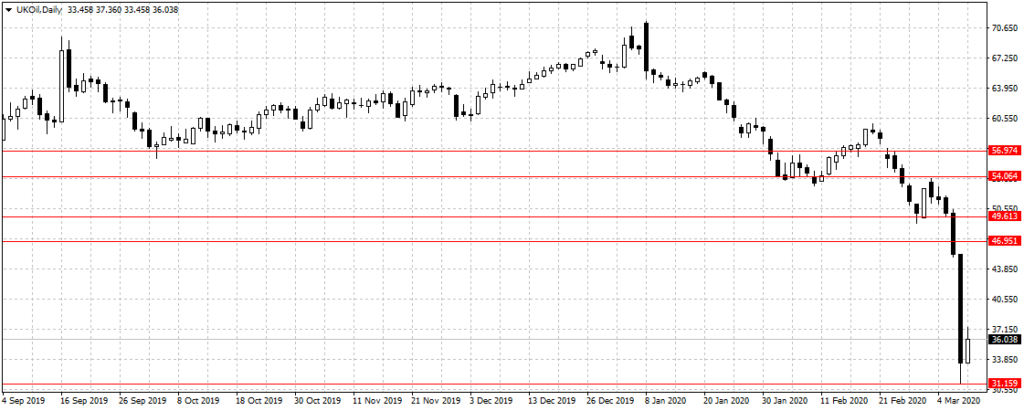- Nigeria to Struggle Amid low Oil Prices, Weak Reserves
President Muhammadu Buhari on Monday sets up a new committee to review the impacts of low oil prices on the 2020 budget following a 30 percent decline in oil price on Monday, bringing the year-to-date decline to 49.5 percent.
Crude oil plunged from $71.28 per barrel it traded in January 2020 to $31.26 on Monday before pulling back to $36.03 a barrel after Saudi Arabia and other OPEC+ members failed to convince Russia to agree to an additional cut of 1.5 million barrels per day to artificially prop up oil prices as more cases of coronavirus weighs on global oil demand, especially from China, the largest importer of the commodity.
 President Muhammadu Buhari had passed a N10.59 trillion budget for the year with oil price benchmarked at $57 per barrel while crude oil production was assumed at 2.18 million barrels per day. The administration estimated that about 35 percent or N3.7 trillion of the N10.59 trillion budget would come from oil revenue while the N2.18 trillion estimated deficit would be financed through foreign and domestic borrowing and the 50 percent increase in Value Added Tax (VAT) and other locally generated revenue would take care of the rest.
President Muhammadu Buhari had passed a N10.59 trillion budget for the year with oil price benchmarked at $57 per barrel while crude oil production was assumed at 2.18 million barrels per day. The administration estimated that about 35 percent or N3.7 trillion of the N10.59 trillion budget would come from oil revenue while the N2.18 trillion estimated deficit would be financed through foreign and domestic borrowing and the 50 percent increase in Value Added Tax (VAT) and other locally generated revenue would take care of the rest.
But with crude oil trading at $36.03 a barrel, the federal government is losing $20.97 per barrel assuming production level remains 2.18 million barrels per day. That represents a daily decline of $45,715,600 (218,000,000 X 20.97).
However, Nigeria is not producing 2.18 million barrels per day going by OPEC report for December and January. Nigeria’s oil production stood at 1.57 million barrels per day in December and 1.77 mbpd in January, according to an independent oil tracking agency, CEIC. Another report from Bloomberg painted a sad picture of the country’s current position, the report stated that 70 percent of the nation’s April sales have no buyer despite huge discount being offered. The story is not different for Angola and other oil-producing economies. The difference, they have alternatives and effective diversification plans.
In February, the International Monetary Fund (IMF) downgraded the nation’s growth projection for the year from 2.1 percent to 2 percent, citing slow economic recovery amid weak revenue to debt profile. In the same month, Standard and Poor lowered the nation’s credit rating from stable to negative, again citing weak revenue, falling oil price and limited space for stimulus.
The nation’s foreign exchange reserves declined from $45 billion recorded in June 2019 to $36.2 billion in March 2020 as oil price continues to decline so do the nation’s reserves which the main source of funds is crude oil. High importation, capital flight, and weak capital importation are some of the challenges hurting Nigeria’s liquidity.
Inflation rate rose to 12.13 percent in January, eroding consumer spending, retail sales and household income despite a high unemployment rate of 23.1 percent or 20.9 million unemployed people. With the foreign reserves fast declining, credit agencies downgrading the nation’s credit rating and global growth projected to slow down in 2020, the nation would struggle to sell its Eurobond scheduled for September as it did in 2018 when it sold $2.86 billion at a period when crude oil was averaging $70 per barrel.
Even if Mrs. Zainab Ahmed, Minister of Finance, led committee reviewed down the $57 oil benchmark for the year, it still would not address the nation’s low oil production in recent months, rising capital flight, weak capital importation, unclear policy path discouraging investors and the rising cost of servicing debt.
Nigeria spent N2.1 trillion or 22.24 percent of the 2020 budget servicing debt in 2019, that financial obligation continues in 2020 and could surge in subsequent years after the Senate approved an additional $22.7 billion loan for President Muhammadu Buhari.
Despite the aggressive economic diversification approach built around low-interest rates anchor borrowers’ loan of President Muhammadu Buhari administration, Nigerians still crave visible results after years of spending. New job creation remains low with businesses shutting down operations, especially local companies.